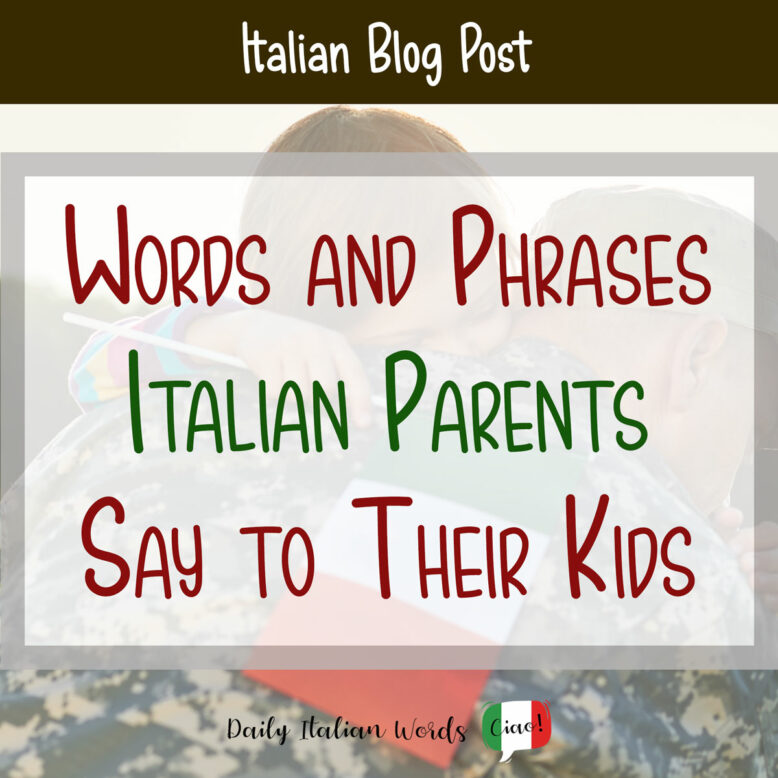Parents often find themselves repeating certain words and phrases to their kids over and over again. While some of these expressions are positive and encouraging, others may not be as pleasant or gentle. Regardless of their nature, these repetitive messages play a significant role in shaping a child’s understanding of the world and their behaviour.
We recently conducted a survey among the 200k members of our Facebook group, inquiring about the Italian words their parents and grandparents frequently used when they were children. In this article, we have compiled the outcomes of this survey – which includes over 1000 responses – to showcase the most common Italian words and phrases that have resonated through generations.
Did you hear any of these Italian expressions growing up? Let us know in the comments below!

Stai zitto!
Be quiet! / Shut up!
Stai zitto! Non riesco a sentire la TV.
Shut up! I can’t hear the TV.
Mangia!
Eat!
Mangia che ti fa bene!
Eat, it’s good for you!
Mani a posto.
Hands in place.
Tieni le mani a posto!
Keep your hands still!
Basta!
Stop! / Enough!
Basta con le chiacchiere!
Stop talking/chatting!
Testa dura
Stubborn (lit. hard head)
Hai la testa dura.
You are so stubborn.
Note: Italian Americans may also be familiar with the dialectal capa tosta, which has the same meaning.

Mannaggia
Darn / Damn
Mannaggia la miseria!
Damn it!
Aspetta!
Wait!
Aspetta, vengo anch’io!
Wait, I’m coming too!
Fai il bravo / la brava
Be a good boy / girl
Dai, fai il bravo con il nonno.
Come on, be good with your grandpa.
Vieni qua
Come here
Vieni qua subito!
Come here now!
Che bello!
How nice/lovely!
Che bello che sei qui!
It’s so nice that you’re here!

Pazienza!
Oh well! / Never mind!
Abbiamo perso il treno, pazienza!
We missed the train, oh well!
Andiamo!
Let’s go!
Andiamo al parco!
Let’s go to the park!
Santa pazienza!
For goodness sake!
Santa pazienza, non mi seccare.
For goodness sake, don’t get on my nerves.
Chiacchierone
Chatterbox
Sei un vero chiacchierone.
You’re a real chatterbox.
Bello / Bella
Handsome / Beautiful
Come sei bello / bella!
You’re so handsome / beautiful!

Mamma mia!
Oh my goodness!
Mamma mia, che caldo che fa!
Oh my, it’s so hot!
Note: A common variation on this is Madonna mia! (My Madonna!).
Tesoro
Treasure
Sei pronto, tesoro?
Are you ready, treasure?
Note: Tesoro is a term of endearment in Italian, much like sweetie in English.
Pazzo/a
Crazy
Tu sei proprio pazzo!
You are so crazy!
Cafone/a
Bad-mannered, oafish, inbecile
Lui è un vero cafone.
He is such an oaf.
Vergogna
Shame, disgrace, embarrassment
Quel ragazzo è la vergogna della famiglia.
That boy is an embarrassment to the family.

Ancora
Again, yet, still
Voglio farlo ancora!
I want to do it again!
Faccia brutta
Ugly face
Ma che faccia brutta che hai!
What an ugly (dirty) face you have!
Note: This is often used endearingly to refer to a child with a dirty face, or a child who is crying.
Capisci
You understand?
Capisci cosa voglio dire?
Do you understand/know what I mean?
Capocollo
A traditional Italian pork cold cut
Come si mangia il capocollo?
How does one eat capocollo?
Note: Italian Americans will know this word as the slang term gabagool.
Stonato
off-key / tone deaf / dazed
Luigi è proprio stonato.
Luigi really is tone deaf.
Note: Italian Americans will know this word as the slang term stunad, which is a slang term that means idiot or stupid.

Strega
witch
La strega vola sulla scopa.
The witch flies on a broom.
Figlia mia / figlio mio
my daughter / my son
Ti voglio bene, figlia mia.
I love you, my daughter.
Pronto
ready
Sei pronto, tesoro?
Are you ready, treasure?
Porca miseria!
Good grief! / For goodness’ sake!
Porca miseria, ora come facciamo?
Good grief, what are we going to do now?
Faccia bella
Beautiful face
Che faccia bella che hai.
You have such a beautiful face.


Heather Broster is a graduate with honours in linguistics from the University of Western Ontario. She is an aspiring polyglot, proficient in English and Italian, as well as Japanese, Welsh, and French to varying degrees of fluency. Originally from Toronto, Heather has resided in various countries, notably Italy for a period of six years. Her primary focus lies in the fields of language acquisition, education, and bilingual instruction.


